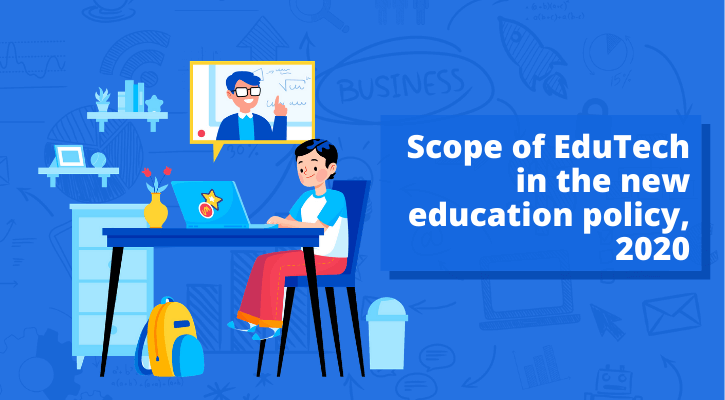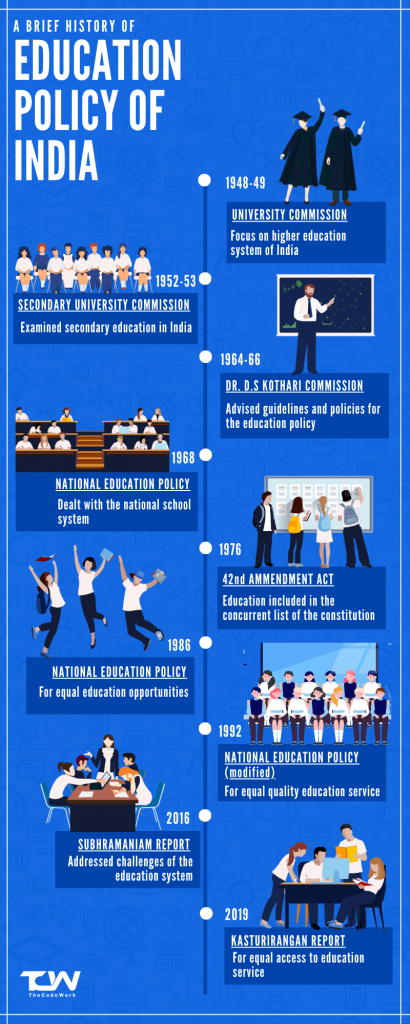
The new National Education Policy (NEP) got approved on July 29, marking a huge change in the face of academics in India. This program is expected to bring in some changes starting from the schools to the university paradigm.
Now, this is a huge change in the academic interface of the country. India has mostly been following the education policy that had been framed by the British with minor changes over the years.
This is a colossal change not only for the students but also for various industries that run in the same loop indirectly. Especially the EduTech sector and EduTech start-up ventures. We will get to that in this very article.
Follow up!
Before getting to the scope of EduTech in the new education policy, do have a look at the major snippets of the policy.
Here you go:

So as you can see, digital learning is going to occupy a huge space in the academic front of the country. The education platform is tilting towards technology and it is good for the students as well as the industries here.
Consequently, it is the best time for the EduTech industry to bloom. This is also a huge opportunity for the various EduTech start-up sectors of the country to rise and shine in the market.
The global pandemic had anyway generated a surge in demand for digital learning. In addition to this, the new education policy has paved a way for the EduTech industry to grow.
The major scope of the EduTech sector can be listed as:
Under the new policy, the government is reportedly planning an independent body (National Educational Technology Forum or NETF). This will enable a valuable exchange of innovative ideas on the utilization of technology to improve digital learning.
With a lesser focus on regulated exams, conceptual assessments will be highlighted. Fresh EduTech business models will arise that will emphasize learning involvements instead of shallow scores.
Here is a comprehensive review of the reaction of numerous startup founders to the new education policy.
Take a look!
As per the CEO of Byju’s, Byju Raveendran, the focus of the new policy to provide the students with digital education services and flexibility is a huge welcome.
According to the group, digital learning is the finest way to deliver knowledge. That too, irrespective of physical barriers or absence of proper infrastructure.
He further lauds that the emphasis on creativity and conceptual learning will inspire students to grow as self-motivated individuals. In addition, it is also a great opportunity for the EduTech sector.
Added that the push to increase gross enrolment ratio, and topics like coding is a great step.
Coming to coding, Byju’s has recently acquired the Mumbai based ed-tech startup, WhiteHat Jr. WhiteHat Jr. is a digital platform for imparting coding classes to students to encourage them to make a career in game design, app design, etc.
The co-founder of Coding Ninjas, Ankush Singla, said that it is a great initiative by the government with the new education policy. He further added that, with the lockdown situation, digital education services are the best that could happen to the academic sector.
Ankush further suggests providing better equipment and tools to the students of remote areas. This would further help them to avail of the digital education services in the best way.
With the decision of imparting online classes, the students are at an advantage. They can use the time at home in a positive way and not lose the years to the global pandemic. As he rightly says, the EduTech industry is great support at this time.
He further adds, that e-learning adds more value than the traditional form of learning. The initiatives broadcasted by the government will aid many students if implemented judiciously. In addition to that, this is also a great opportunity for the EduTech sector.
The CEO and Co-founder of Toppr, Zishaan Hayath, welcomed the move. He says that technology is the adhesive to mend cracks in the education system.
He further adds that, as a team, Toppr is very excited about this change. They are happy to be a part of this by being a platform for online education. This includes the new coding basics at the elementary level as well.
He assures their availability as a team for the academic progress of the country.
The CEO and Co-founder of KopyKitab, Sumeet Verma,says that the education policy focuses on technological advancement in the academic line, which is purely welcome.
He says, that the courses being online and being delivered in the native languages are innovative and refreshing. He goes on to assure that, e-learning will evolve to be the core part of the Indian education system.
The CEO and co-founder of Leverage Edu, Akshay Chaturvedi, says that the abolishment of science and arts as two different streams will evolve the Indian students to become “global students”.
This will help the students from India to be accepted in colleges abroad and vice versa. This will further step up the quality of education and students on a wide scale.
He further adds that this will give the higher education-tech companies a great opportunity to build career growth tools for the betterment of education in our country.

We had a look at the reaction of the start-ups to the new education policy. Consequently, let’s have a peek at what the other industries have to say to this:
Dr. Shahani welcomes the policy by saying that the education system of India should have changed years back.
He further adds – “The focus on light government regulation, multidisciplinary institutions and creating equivalence of vocational and academic streams are welcome, but these have been a part of other countries’ education models for years.”
Mr. Ramananda welcomes the change by saying that the new education policy is expected to enhance the quality of the education system in India. Not just that, he says that this policy is also going to boost the EduTech start-up ventures of the country.
He adds that – “The announcement regarding 6% public investment of the GDP in the education sector will provide a much-needed boost to the quality and scope of education in the country.”
Abhishek from Oliveboard expresses how positively this new education policy is going to impact the education paradigm of the country. He says that this policy will mark an over-all development of the educative mind of a student. The fact that it focusses on extracurricular activities, is a plus point.
He further adds – “The introduction of vocational learning & coding from 6th std onwards would help develop students the skill set required to grow in the modern world.”
As we can already infer from the various business viewpoints, the new education policy is good news for the country. As per reaction of the start-ups to the new education policy, the core features of the National Education Policy (NEP) is a major boost for the EduTech industry.
Consequently, there stands a huge opportunity for the EduTech sector. Along with the involvement of the EduTech start-up ventures, the academic system is going to be at a huge gain.
With the global pandemic changing the outlook of education globally, it is time for the EduTech industry to welcome new ventures.
Also if you want to have a quick review of how the pandemic is affecting the EduTech industry, have a look at our business report for a crisp view.
So, bring in the new ideas and follow us up at TheCodeWork to build your MVP before the final launch.